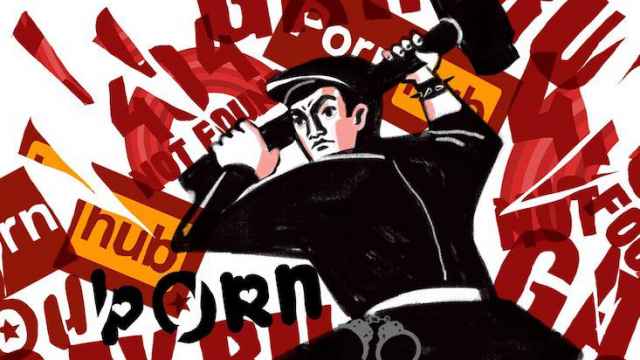Russian movie distributors have self-censored a gay sex scene from “Supernova,” a British love story starring Stanley Tucci and Colin Firth that was released in Russia on Thursday, media reported.
Citing viewers who had also watched the original edit, the DTF culture and tech platform said “at least one scene where the characters try to have sex after a dramatic dialogue has disappeared from the story.”
“Still, several viewers of the stripped-down version confirmed that it’s clear from the context even after self-censorship that the characters are a couple,” it reported.
According to author and critic Konstantin Kropotkin, “Supernova’s” Russian distributor World Pictures went to the cutting board out of fear that movie theaters would refuse to release it and its premiere would be mired in “excesses.”
The company appeared to be concerned about Russia’s law banning “homosexual propaganda to minors” (though “Supernova” is rated “18+” for mature audiences) and past attacks on venues that had screened controversial movies.
Russian multimedia project Snob further reported, citing its deputy chief editor, that World Pictures had asked it to remove all mentions of the word “gay” from its reviews.
A film.ru review published Wednesday noted that the self-censorship backfired and “made this love story even more poignant and delicate.”
“Now the ‘Russian’ version of ‘Supernova’ even more clearly shows the huge social gap between us and the conventional West,” wrote critic Yefim Gugnin.
Director Harry Macqueen’s “Supernova” follows in the footsteps of Disney’s “Onward,” the Elton John biopic “Rocketman” and Marvel’s “Avengers: Endgame,” which all have shorter runtimes in Russia due to LGBT-related content.
The “Rocketman” scandal prompted the iconic British musician to openly criticize President Vladimir Putin’s LGBT rights record. In response, Putin railed against “five genders and transformers” in what conservative Russia refers to as the liberal West.
Russia has also previously canceled screenings of historical dramas and comedies, including “The Death of Stalin” and “Child 44,” for their portrayal of sensitive subjects from the Soviet era.
A Message from The Moscow Times:
Dear readers,
We are facing unprecedented challenges. Russia's Prosecutor General's Office has designated The Moscow Times as an "undesirable" organization, criminalizing our work and putting our staff at risk of prosecution. This follows our earlier unjust labeling as a "foreign agent."
These actions are direct attempts to silence independent journalism in Russia. The authorities claim our work "discredits the decisions of the Russian leadership." We see things differently: we strive to provide accurate, unbiased reporting on Russia.
We, the journalists of The Moscow Times, refuse to be silenced. But to continue our work, we need your help.
Your support, no matter how small, makes a world of difference. If you can, please support us monthly starting from just $2. It's quick to set up, and every contribution makes a significant impact.
By supporting The Moscow Times, you're defending open, independent journalism in the face of repression. Thank you for standing with us.
Remind me later.






